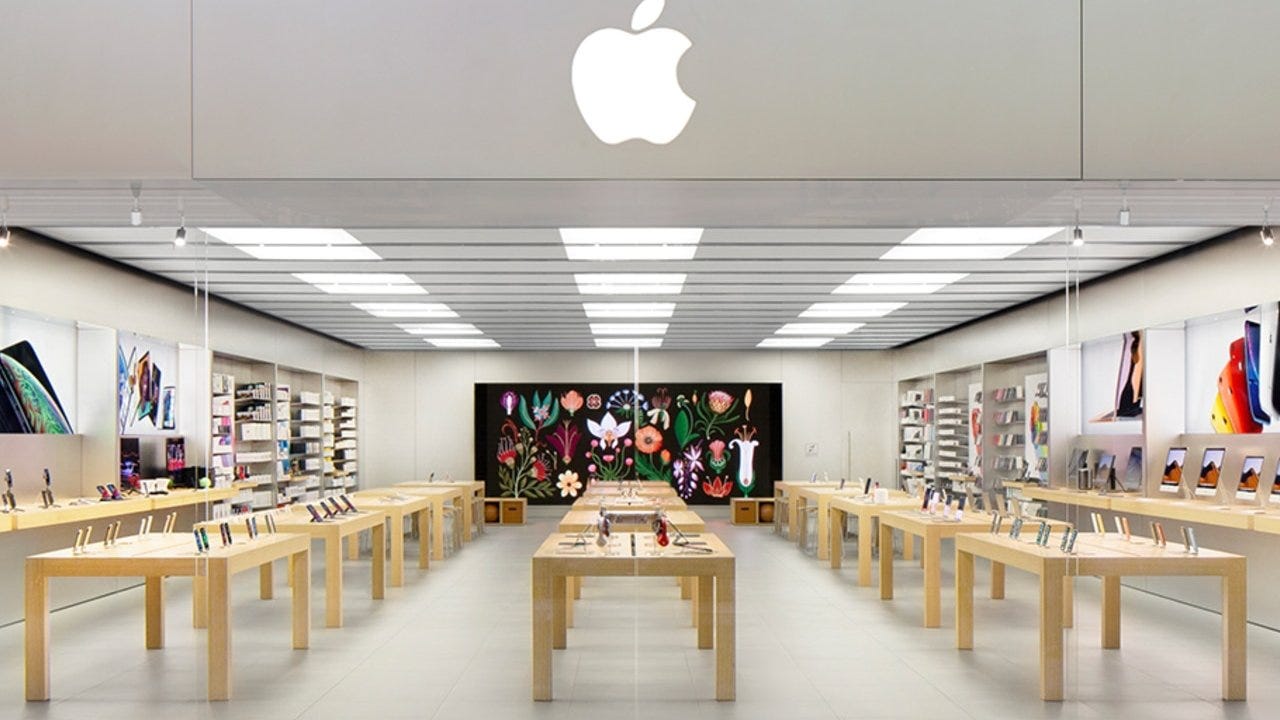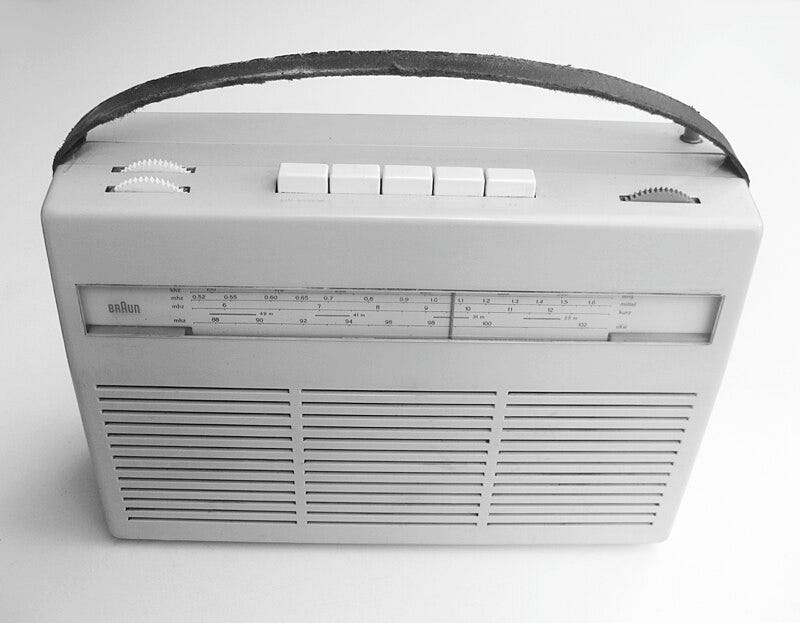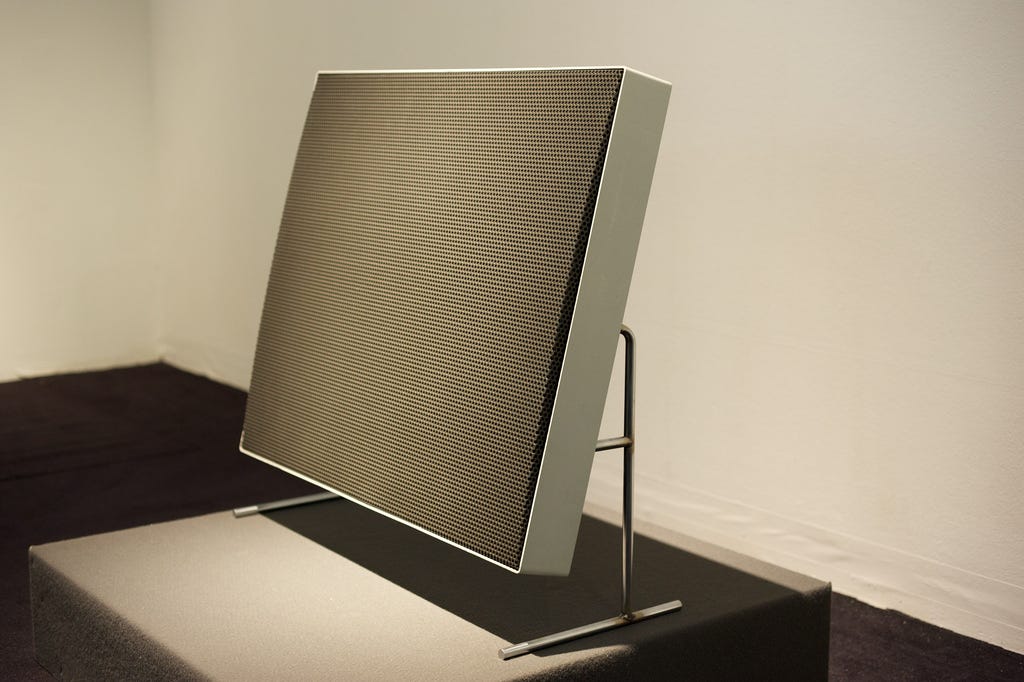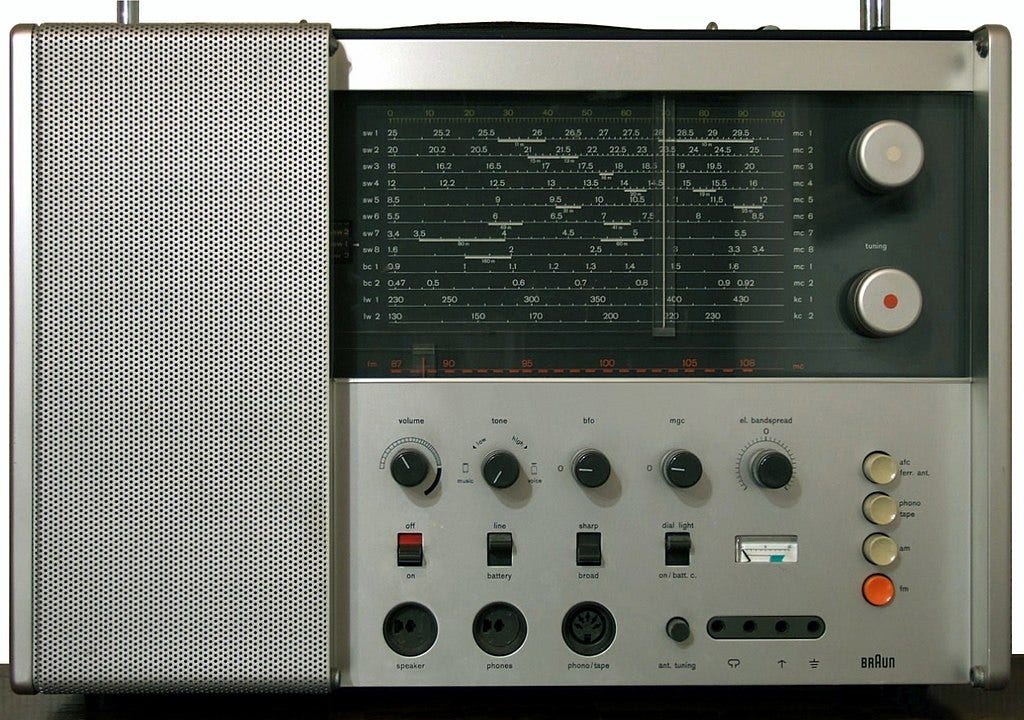Against Dieter Rams
"Less, but better," elegance, degrowth, stupidity, and the social control over humanity
Dieter Rams isn’t a household name. However, his version of functionalism (that design should focus on its purpose and be as minimal as possible) has profoundly influenced the American liberal elite and their aesthetic taste against the world’s arts, technology, and economy. Industrial design is applied to physical products that are to be manufactured by mass production, and that means everyone is forced under Rams’ influence, whether we like it or not.
To Rams, “Weniger, aber besser,” or “Less, but better.” He believes that, “Indifference towards people and the reality in which they live is actually the one and only cardinal sin in design."1 The principle sounds harmless, but it’s far from creating art or design for the sake of humanity. This is a type of pleasure principle or a statement that people care only for the self. Instead of fostering intellectualism and growth of critical thinking, the design is minimized for the ideology of “elegance,” where it is stripped to serve a function and nothing else.
Again, what’s so bad about a product that is easy to understand? The simple answer is that it makes people stupid, because the design enforces an echo chamber, or operant conditioning chamber, on the user. It's doing things with no thought behind the action. You can thank Dieter Rams for TikTok and the Apple corporation, who prey on those with short attention spans. This is why “Ramism” is seriously a bad influence in the arts and of design.
Clarity is not elegance. Elegance is graceful, removing unwanted traits. Elegance is a subjective pleasure of control, with a novel or original function. Elegance is simple because it is supposed to serve the stupid. Clarity may get to the point, but elegance is the militant ideology that makes sure we don't resist.
Industrial design was never about perfecting design or art for humanity. Industrial design, from companies like Braun or Vitsœ, is about profits in command. Functionalism may have origins in socialist realism, but industrial design is about getting the cheapest parts possible, creating the fastest product possible, and delivering a minimal product with “better” results that don’t cut into the budget. Industrial design is about uniformity; everyone has the same products with the same functions, on top of a limited function to never question this reality. People give in to their desires, and industrial design plays into them. It can be addicting like internet pornography, like downloaded content for a video game, all while saying how everything could be said and done by a powerful AI that cares for the consumer and their dreams. This is the endgame of Dieter Rams, and how his design is a method of social control, not a preference for future-retro furniture.
The mainstream concept of “interactivity” is defined solely as a relationship between humans and machines. Liberals believe that “Anthropocentrism,” or “human supremacy,” is problematic because it assumes that only humans exist in the world and that both animals and non-living objects are inferiors. Egalitarianism also projects this through design, and must only speak of a relationship between the living and non-living. Interactivity in game design is seen as a selfish illusion, where the “player” can only “interact” in a simulacrum with other prisoners. If I reject this can proclaim that interactivity can only be an anthropocentric activity, I too will be blacklisted from any design firm. We all know that interactivity is only between humans, and not machines. This propaganda that interactivity is only between machines is a form of social control for the coming techno singularity the elite want to implement. Rams is quite aware of this future dystopia in his work.
Significantly, Rams follows a ten-point list of what constitutes “good design.”
It follows:
Innovation. The product should be in tandem with the current tech we currently have.
Usefulness. This is psychological, as good design emphasizes the usefulness of a product whilst disregarding anything that could detract from it.
Aesthetics. Products are used every day and have an effect on people and how they see the world. Only well-executed objects can be beautiful.
Understandable. The product clearly expresses its function by making use of the user's intuition, which should be self-explanatory.
Unobtrusive. Products that fulfill a purpose are like tools. They are neither decorative objects nor works of art. Their design should therefore be both neutral and restrained, to leave room for the user's self-expression.
Honest. The design does not make a product appear more innovative, powerful, or valuable than it is. It does not attempt to manipulate the consumer with promises that cannot be kept.
Long-lasting. It avoids being fashionable and therefore never appears antiquated. Unlike fashionable design, good design can last many years, even in today's throwaway society.
Thorough down to the last detail. Nothing must be arbitrary or left to chance. Care and accuracy in the design process show respect towards the consumer.
Environmentally friendly. Design makes an important contribution to the preservation of the environment. It conserves resources and minimizes physical and visual pollution throughout the lifecycle of the product.
And “as little design as possible.” Less, but better. Simple as possible, but not simple. Good design elevates the essential functions of a product.
The philosophy of Rams’ design can be found in every single product he has contributed to. They are marked by the simple colors, few buttons, and minimalism. The product presents itself as minimal and intellectual when it actually comes off as shallow and pretentious.
The obnoxious minimalism and elegance make a statement about boutique elitism. What is supposed to be easy to use ends up becoming devices of lameness and decadence. The synthesizer companies of Teenage Engineering, Elektron, and Torso all follow the social control mechanism of elegance. Their products look the same as Rams’, as if everything now has a bland “rustic” look. Fast-food architecture and the digital typewriters of Astrohaus have also fallen prey to the order of Dieter Rams. Grey, rectangular, and featureless. Just like the musical instruments. Capitalism only cares about controlling your desires, at the lowest price with the highest profit possible.
Going by each point that Rams makes, it is easy to rebuke the case of “good design” as being cultural traits of a Silicon Valley elite that are in it to grift humanity into their prison pods.
First, “innovation” is a novelty. No one can invent innovation, as it is later defined by a cultural impact in a market and not so much in human invention. Trying to be innovative can only lead to being trendy.
Second, sometimes “usefulness” isn’t a necessity, as the influence of the individual, technology, or culture may affect the design and how it is used. A Roland TB-303 wasn’t meant to be used as a sequencing lead instrument and was rather meant to emulate a bass guitar. These subtle distractions can be very enlightening and show the personality of the product.
Third, aesthetics is a subjective phenomenon, and someone’s taste of beauty may conflict with another. To assume there is one “good” aesthetic, such as being grey and lifeless, is incredibly pretentious. A dark aesthetic won’t change someone’s mood, as this implies there is ethics about what is good or evil in art direction. No one can say that a can opener is beautiful because this is an ideological statement of how one should live with peculiar brands.
Point four, intuition is not universal, nor will it ever be. The Western concept of being “self-explanatory” will conflict with what is self-explanatory by Eastern eyes. Assuming a picture of a complicated task will help ease of operation assuming people are intelligent enough to use common sense. People will mess around with the interface until something happens, and they may break it. This is why written language is superior to any sense of a “graphic novel.” People will not follow orders, and expect them to use the microphone as a pepper crusher.
Point five, a product being unobtrusive is idealistic. People will always demand more from things that can’t speak their language. Board games and synthesizers should be self-expressive, but companies are out for profit and will do anything to glamorize these things as edible products and fashion statements. Again, like a simple interface with intuition or showing a universal graphic language, these concepts are idealistic and never final. By reaching a stage of complete rational design, it will still negate the person or culture’s influence over it. The car is not a typewriter.
Point six, this is a lie on Rams’ behalf. Rams has been making products out for a profit since his first job, and this while collar managerial climbing is wishful thinking. Products have to manipulate and exploit a person. If an entire market was ideally based on the idea people are buying parts in a computer, that would also mean everything must follow this rigid hobbyism. It’s out of touch with how capitalism works.
Point seven, this is not the case. Not even Apple computers can do this, as a new operating system comes around the corner, and Apple forces everyone to buy a new computer again. An Apple computer may be stuck in Big Sur forever without being updated. What then, is “long-lasting,” if the obsolete tech becomes stagnant compared to the newer and tantalizing tech of today? Who wants to write a 500,000 fantasy novel in Windows Dos in 2023? It’s not that it’s a hipster thing, it just doesn’t take into account world history. Universalism is a bad paradigm.
Point eight, the consumer does not care about fine details. Only intellects care about minor things. When minor things are found by average people, they often mock them and don’t question the integrity of the science. To assume that design could be simple, yet advanced, is a total contradiction to the base which the product is intended for; stupid people. Stupid people need stupid things.
Point nine, this is Malthusian ideology. It’s not about “the environment,” as this red herring is rather a Eurocentric paternalism about degrowth. What is easy to recycle is easy to buy and make. Thus it becomes impossible to make sophisticated technology with inferior parts. Rams is making an anti-Chinese statement about production, which we all know, he’s in the wrong. It’s not possible to make a supercomputer using parts that can’t make it. Degrowth can only benefit a tiny elite that has the privilege to use scarce resources, all while everyone else gets a McDonald’s cheeseburger filled with cow blood and body parts, simulating itself as real cow meat.
And point ten, what is even the point of design in the first place if one has to focus less on it? This shows that Rams could very well be a manager who bullies people around, and attacks the blue collar worker who makes the wooden chair. This is Marxist alienation, where no one is allowed to own and celebrate the things they make. A product can’t be a Reversi or a Chess set. To strip down everything to the obvious “function” is an atheist understanding of the world, not taking into account metaphysics; the very soul of human creativity.
There are many things wrong with functionalism and the so-called cult of Dieter Rams. The elites love him because they want to create a world full of desire boxes and button pressing of instant gratification. The point is to make people stupid, while the elite can express their decadence. Limited language means limited words, and elegance strips down thought to infantile reactions. The reason why people dump Mac computers and go back to PC or Linux is because the latter computers offer intellectual freedom, ownership, and sophistication a dumbass blank calculator can’t. If everyone relied on elegance, people would give in to hedonism. Technology would be a third eye, where like Smartphones, the elegant tech must always be there, watching and manipulating our desires. Sophisticated and anti-elegant technology would encourage problem-solving, critical thinking, and independence. A true artist and intellect is a C++ programmer, not a button-pressing monkey.
I proposed that are going through a “post-elegant” crisis, where so many of these products cloning the Dieter Rams ethos will soon be thrown away because smart people are bored and angry with limitations. Elegance will be reborn into a contradiction between simple but uncertain, where the uncertainty outcome is like a modular system that users can deconstruct. Post-elegance will be evident in the future of game design and the arts. There will be a psychedelic trip of newer products that flip Ramism on its head and create new artistic tools of sophistication. It won’t be about the puzzle and exact math formula that has to be solved, but about the post-modern condition where nothing can be confirmed as true, and technology no longer helps people, and rather, people remix and mess up the elegant tech. A new hacker culture will be on the rise against elegance.
Dieter Rams is a bad influence because global capitalism relies on his art direction. This is manifested through non-offensive egalitarianism and inclusive liberalism. Make it dumb, you get dumb people. We can break from this fad by realizing programming is a science. Programming will never dumb itself down for people who want the easy way out. Writing works the same way, in that clarity and application are about how the English language is written, formatted, and presented. It’s not possible to make a friendly version of In Search of Lost Time. It’s sophisticated for a reason. Art should remain independent from the force of meritocracy. Design is a part of art the same way “philos” is to expression.
Elegance is a type of social control. The point is to break from it.
-pe
12-13-2023
Dziersk, Mark (2 December 2012). "In tribute to Mr. Rams". Fast Company. Retrieved 5 December 2022. (https://www.fastcompany.com/1815761/tribute-mr-rams).




















